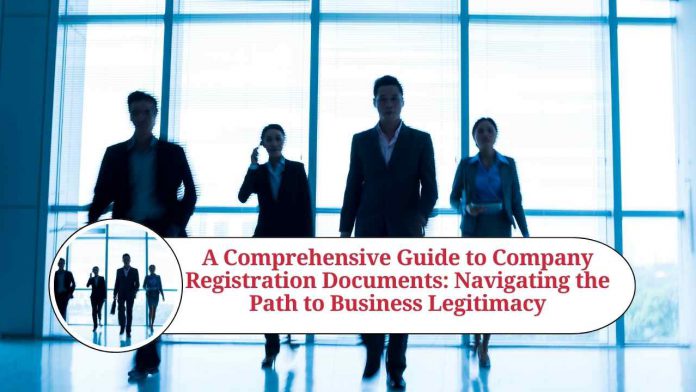Introduction of Company Registration Documents
Starting a new business venture is an exciting and challenging journey. One of the crucial steps in establishing a business is the process of company registration. Registering your company not only gives it a legal identity but also enables you to operate within the framework of the law, gain credibility, and access various benefits. To successfully register your company, you need to understand the essential documents required for the process. In this blog post, we will explore the key company registration documents and shed light on their significance in setting up a legitimate business.
- Memorandum of Association (MOA): The Memorandum of Association is a fundamental document that outlines the company’s constitution and objectives. It contains vital information such as the company’s name, registered address, objectives, authorized share capital, and details of shareholders. The MOA serves as a blueprint for the company’s activities and is a crucial document required during the company registration process.
- Articles of Association (AOA): The Articles of Association complements the Memorandum of Association and sets out the internal rules and regulations governing the company’s operations. It defines the rights, powers, and responsibilities of shareholders, directors, and other key stakeholders. The AOA covers aspects such as the appointment and removal of directors, shareholders’ meetings, voting rights, dividend distribution, and more. Together with the MOA, the AOA forms the constitution of the company.
- Certificate of Incorporation: The Certificate of Incorporation is an official document issued by the Registrar of Companies upon successful completion of the company registration process. It certifies that the company has been legally formed and recognized as a separate legal entity. The Certificate of Incorporation includes essential details such as the company name, registration number, date of incorporation, and registered address. This document is crucial for conducting business activities, opening bank accounts, and engaging with clients and stakeholders.
- Director and Shareholder Details: During the company registration process, you will need to provide detailed information about the directors and shareholders of the company. This typically includes their names, addresses, contact details, and identification documents such as passports or identity cards. It is essential to ensure accuracy and compliance with legal requirements when providing these details.
- Registered Office Address Proof: A registered office address is the official address of the company where legal notices, communications, and government correspondence are sent. To establish the legitimacy of your business, you must provide proof of the registered office address. This can be done by submitting utility bills, rental agreements, or ownership documents, which clearly display the address.
- Share Certificates: Share certificates are legal documents that serve as evidence of ownership for shareholders in a company. These documents confirm the number of shares held by each shareholder and their respective ownership percentages. Share certificates are typically issued to shareholders after the company’s formation and allotment of shares.
Conclusion
Company registration is a crucial step in transforming your business idea into a legally recognized entity. Understanding the essential company registration documents is vital to ensure a smooth and successful registration process. From the Memorandum of Association and Articles of Association to the Certificate of Incorporation and shareholder details, each document plays a significant role in establishing your company’s legitimacy and credibility. By adhering to the legal requirements and submitting the necessary documents accurately, you can pave the way for a solid foundation for your business and embark on a path towards success.
Read more useful content:
Frequently Ask Question
Q. What is the difference between the Memorandum of Association (MOA) and the Articles of Association (AOA)?
The MOA outlines the company’s objectives, authorized share capital, and other fundamental information. It defines the external relationships and scope of activities of the company. On the other hand, the AOA contains internal rules and regulations governing the company’s operations, such as the rights and responsibilities of shareholders and directors, procedures for meetings, and more.
Q. Why is the Certificate of Incorporation important?
The Certificate of Incorporation is a vital document issued by the Registrar of Companies. It signifies that your company has been legally formed and recognized as a separate legal entity. It is essential for conducting business activities, opening bank accounts, entering into contracts, and engaging with clients and stakeholders.
Q. What details are required for directors and shareholders during company registration?
You will need to provide information such as the names, addresses, contact details, and identification documents (such as passports or identity cards) for directors and shareholders. It is crucial to provide accurate and up-to-date information to comply with legal requirements.
Q. Why is proof of the registered office address necessary?
Proof of the registered office address is required to establish the official address of the company for receiving legal notices, communications, and government correspondence. Utility bills, rental agreements, or ownership documents can serve as valid proof.
Q. What are share certificates, and why are they important?
Share certificates are legal documents that serve as evidence of ownership for shareholders in a company. They confirm the number of shares held by each shareholder and their respective ownership percentages. Share certificates are crucial for maintaining a transparent record of share ownership and for conducting future transactions involving shares.
Q. Are there any specific formatting or content requirements for company registration documents?
Yes, there are often specific formatting and content requirements for company registration documents, which may vary depending on the jurisdiction. It is advisable to consult the relevant government authority or seek professional advice to ensure compliance with the specific requirements.
Q. Can company registration documents be amended or updated after the registration process?
Yes, certain documents like the MOA and AOA can be amended through a formal process. However, it is important to note that changes to these documents require compliance with legal procedures and may involve notifying the Registrar of Companies or obtaining shareholder approval, depending on the jurisdiction.




















